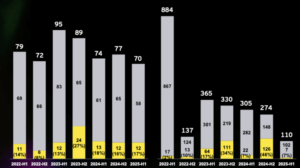The New Rules of the Electric Power Industry: an Opportunity for Innovation

Liberalization of the electric power industry in Bulgaria is slowly becoming a fact and businesses are going to be impacted by the change no later than October. Starting from the beginning of September, all medium-sized and small firms must choose an electricity producer from whom to buy megawatt-hours. While there have been some doubts among owners whether they will be able to fulfill the requirements on time, several platforms have digitalized the process and are there to help the firms go through it entirely online. But is the electricity industry finally becoming digitalized? Information campaigns on this important change have been scarce. Trending Topics has gathered the facts.
Digitalizing the Conservative Energy Market
The liberalization of the electricity market has been an initial target of the European Union. Bulgaria, like the rest EU members, is now obliged to provide its citizens with the opportunity to choose their electricity producers freely. The change is taking place gradually – the plan is that household consumers will also be able to choose their electricity supplier, starting from 2021. When it comes to the electricity market, suppliers and consumers are not the only players. Electricity retailers are a third category on the market. These are the entities that purchase electricity from the wholesale market to sell to residential and business users. The role of retailers in a nutshell is to mediate between consumers and big electricity suppliers.
The liberalization of the electricity market, as well as a recent change in Bulgaria’s Energy Law, have created conditions for innovation processes to occur in the way retailers operate. What triggered the process for retailers was a legislative change from July 2020 that allowed the usage of one’s digital signature for contracting with an energy supplier. The change has given retailers an opportunity to shift their role in the chain as it has allowed them to play a bigger one in the process. Some retailers have grabbed the new opportunity.
One such example is Toki, the first online platform that has digitalized the process of changing one’s electricity supplier. The service of the platform enables customers to change their electricity supplier entirely online. Choosing a digital platform such as Toki is connected to allowing the retailer behind to do the administrative work around changing a supplier. This includes anything from communicating an electricity plan that fits a customer’s profile to arranging the final contract between the supplier and the client on behalf of the latter. “The electricity industry is traditionally very conservative and every change that occurs is related to an enormous amount of paperwork. What is unique about us is that we have focused on taking the bigger part of the administrative work that has to be done by a client in order for him/her to change his/her supplier,” says Yuri Katanov, managing director of Toki. Pros, Cons and Challenges of the Liberal Electricity Market
According to Katanov, the competitive nature of the new market will be beneficial for clients as the different companies implement strategies for gaining more customers. The companies are going to give customers a bigger range of plans to choose from in accordance with their personal preferences. Relying entirely on renewable energy is a new option to be introduced. There is a high chance that the new regulations will also contribute to the digitalization of the electricity industry, which will offer entrepreneurs a new operational market.
Yet, there can be done a lot more in terms of automation of the administrative processes in this market. For one, the process of sensitive data transfer between retailers and different suppliers will have to be regulated. Perhaps the number of platforms that offer online service for transition between suppliers will have to increase in order for the regulations to occur. However, creating and supporting a platform like this can be challenging. “We had to create an entirely new platform for a little more than a month, train our team, and start a marketing campaign,” says Katanov. The next challenge for digital platforms such as Toki is the transition of households to the liberal electricity market, planned to happen in 2021. “Bulgaria has more than 5M households that will have to switch to a supplier of their choice with the help of retailers. This is going to be a big test for our platform,” comments Katanov.





























